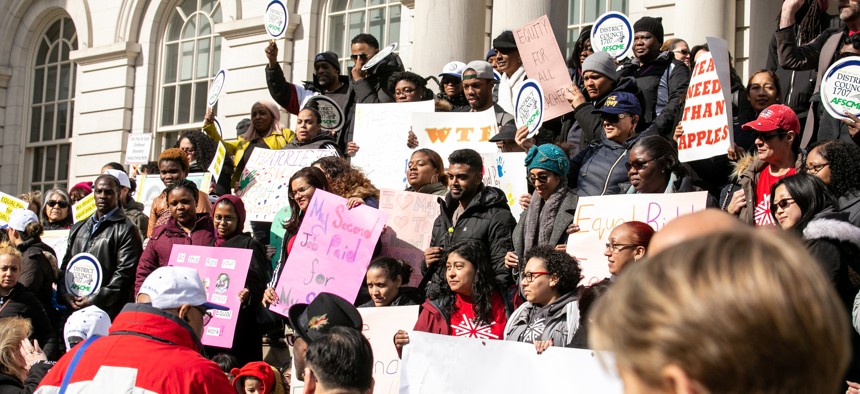What do education nonprofits mean by "salary parity" in NYC?

Nonprofits and elected officials rallied outside New York City Hall on Tuesday in support of “salary parity.” Robert Guttersohn
The New York City Department of Social Services needs parking help. A total of 38 parking spaces are needed at an intake center located at 151 East 151st Street in the Bronx. The agency will huddle with prospective vendors on Thursday, March 28, at 11 a.m., at 4 World Trade Center, 37th Floor in Manhattan, where interested parties can get bid documents “free of charge” [quotes from the original City Record post] at that address in the days leading up.
In other contracting news, Comunilife has received a $2.67 million contract from the Department of Health and Mental Hygiene to provide supported house. The agency is also giving Planned Parenthood of New York City $350,000 worth of heath care business. Three other nonprofits are on the cusp of landing three-year contracts from the agency to provide vocational services to people with disabilities.
A dozen homeless advocates were arrested in the state Capitol on Tuesday. They were there to call on the governor to include Home Stability Support, a proposed rental subsidy program, in the upcoming state budget. Assemblyman Andrew Hevesi has spearheaded a legislative effort to establish such a program, an effort that has gained additional support from 12 members of the New York congressional delegation.
To that end, a group of activists led by VOCAL-NY staged a 24-hour occupation on the second floor of the state Capitol building. “Activists have been telling stories of homelessness: their own stories, the stories of loved ones, and stories of the people they’ve served and cared for,” reads a press release from VOCAL-NY. “They read a statement at the top of every hour to demand a budget that reflects the morals of caring and compassionate New Yorkers.”
BREAKING: arrests are happening at the Capitol. 12 activists arrested fighting for Home Stability Support funding—needed to end NY’s historic homelessness crisis. #NYneedsHSS pic.twitter.com/86Cf0rZ7wo
— VOCAL-NY (@VOCALNewYork) March 20, 2019
Nonprofits and elected officials rallied outside New York City Hall on Tuesday in support of “salary parity.” As things currently stand, teachers who teach children in city-funded 3-K and pre-K programs receive significantly less than teachers who work for the city Department of Education – as much as $32,000 less each year. Those rallying on March 20 to close this gap included: Wayne Ho of the Chinese-American Planning Council, Councilman Steve Levin, Councilman Mark Treyger, NYC Comptroller Scott Stringer, and Jennifer March, executive director of the Citizens’ Committee for Children.
“Community-based organizations serve a significant portion of the students registered in the UPK program. Drastically underpaying the early childhood educators at these organizations isn’t right, it isn’t fair,” said Treyger, a former teacher who chairs the City Council Committee on Education, in a press release. “These educators care for and educate many of our city’s most vulnerable young children. Let’s ensure they are able to do the same for their own children and families by creating long-overdue pay parity for early childhood educators.”
A new report examines how New York City shortchanges the nonprofits that provide early childhood education on its behalf. There is a big difference between what those services cost and what the city actually pays for, according to the report, which was a joint effort by United Neighborhood Houses and SeaChange Capital Partners.
Here are a few takeaways, taken verbatim from a March 20 press release:
- On average, city contracts leave settlement houses with a funding gap of approximately $7,000 per child.
- Starting salaries for teachers in settlement houses are significantly lower than in public schools ($34,085 vs. $56,711), making it difficult to attract and retain talent.
- Other cities with similar early childhood systems have much lower gaps: the Educare Learning Network reported that in Chicago and Miami, differences in funding range from 5 percent to 25 percent.
